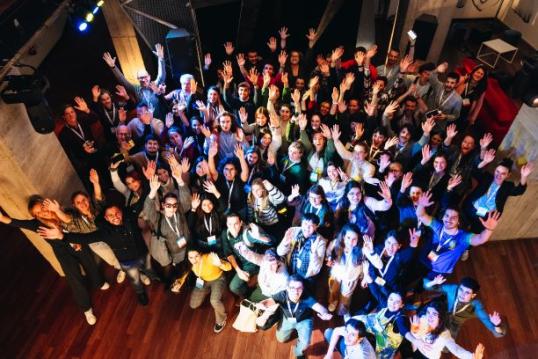HACK4OCEANS II is a 2-day Youth Innovation Event where participants from across Europe learn, explore and co-create opportunities for prosperity through ocean conservation and sustainable use of marine resources. Hosted by the European Commission’s Directorate General for Maritime Affairs and Fisheries (EC DG MARE), in Brussels, the event brought together undergraduate students and professional stakeholders coming from the private sector, policy making and academia.
HACK4OCEAN II participants develop solutions to several important and urgent challenges defined by marine relevant stakeholders, active in the private sector, policy-making and academia. The EC DG MARE organised an Ideation Workshop with key stakeholders in the field, on September 1st 2022, to define and enrich these challenges, which will be related to the following 4 themes:
- Marine litter: How might we accelerate the usage of litter removal technologies by ports, local water authorities and coastal communities? How might we increase citizens’ access to and involvement in marine litter data collection by providing them with better and easier-to-use tools and methods? How might we support industries in designing more recyclable, reusable, and repairable products? How might we raise citizens’ awareness on cost efficient – low maintenance, easily set up tools, aiming to reduce the amount of plastic that ends up into the rivers and seas, at its source? How might we help the industry transition towards less plastic production, by developing the use of alternative materials and encouraging local initiatives on reducing plastic consumption (ex: single use plastic directive)?
- Ocean and Climate Change: How might we support the maritime industry’s transition towards lower climate impact of marine activities (marine transport /tourism/ aquaculture / fisheries etc.) to preserve ocean ecosystems? How might we develop and implement tools that actively help people reduce or mitigate their personal or professional maritime impact on climate change? How might we include information of future changes in the environment (e.g. climate) in Maritime Spatial planning in order to conserve ecosystems in the long term? How might we help the public understand the urgency of taking concrete actions to reduce climate change effects and support it in implementing behaviour change? How might we increase consumers’ awareness of the climate impact of human activities (shipping, aquaculture, fisheries, tourism, etc.), develop greener alternatives and re-localise production and consumption?
- Coastal Ecosystems: How might we communicate the impact of human activities on coastal ecosystems, increase ocean literacy/awareness for the general public, to create public support for ecosystem conservation? How might we attribute values (monetary and others) to coastal ecosystem activities and services, helping evaluate externalities, to reduce human-induced pressures on coastal ecosystems by stakeholders and the general public? How might we support education on the topic of long-term challenges of people using the coastal system, to help them implement short term behaviour change aiming at reducing their impact? How might we ensure the alignment of short and long term objectives related to coastal activities, aiming at ensuring sustainable coastal exploitation? How might we educate users, citizens and blue economy actors to reduce their impact (pollution, degradation, erosion…) on urban and suburban coastal zones and ecosystems? How might we increase protection and expansion of protected coastal areas?
- New sustainable foods and resources: How might we integrate a holistic approach of environmental and socioeconomic impacts of food, aiming at changing consumers’ eating behaviour (eat local seafood, eat bivalves and algae)? How create incentives and accelerate a fair transition of fishers and seafood producers, to achieve lower impact and lower scale of seafood production? How might we develop alternative practices and foods in order to increase variety, attractiveness and quality of marine food options? How might we improve consumers’ literacy about economic, nutritional & environmental benefits and impacts of new and sustainable seafood? How might we reduce impact of seafood production along the full supply chain?
More information on the challenges:
More information on the first Hack4Oceans is also available.
Also view the Event report


